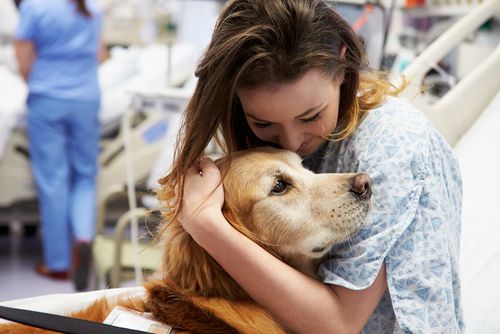What is Animal Therapy?
Animal therapy, or animal healing, is a natural, noninvasive, drug-free therapy for animals that focuses on preventive care. It is suitable for various physical and emotional conditions, and may be used alongside other manual therapies and in conjunction with any on-going veterinary treatment.
It should be remembered that animal therapy is not a cure and cannot provide a diagnosis, so it should never be used as a substitute for proper veterinary care. If an animal is unwell, or has been injured, it must be entrusted to a veterinarian immediately.

How Does Animal Therapy Work?
Animal therapy refers to any form of natural remedy that works holistically on an animal to improve their emotional and physical wellbeing. Animals need proper nutrition, exercise and an environment where they can feel safe and loved. Take away one of these, and they'll exhibit a change in behaviour which could progress to a serious health condition.
Practising animal therapy on your pet, or a farm animal, is a great way to enhance their overall wellbeing. Here are some forms of healing systems that you can consider
- Herbal medicine - various herbs can be used in the treatment of several health conditions like digestive problems, immune disorders and infections.
- Homeopathy - since it is non-toxic for all animals, it can be safely used for newborns and pregnant animals. It can help alleviate ailments, including skin conditions, cataract and nervousness.
- Flower Essences - they are excellent in addressing emotional and behavioural conditions such as fear, nervousness and hyperactivity.
- Aromatherapy - essential oils may be diluted, or combined, to be used externally. It is effective in repelling biting insects, soothing inflamed or irritated skin, and as an antiseptic.
- Nutrition - it has a major role in the treatment and prevention of several common diseases that pets usually suffer from. An animal therapist examines the animal's diet and changes it if necessary.
- Hair Mineral Testing - this type of therapy uses hair to test and analyse the mineral levels in an animal's body.
- Fasting and Detox Therapy - It removes toxins and other impurities from the animal's body.
- Iridology - assessing the structure, colour and patterns of the animal's iris will reveal the state of health of every organ in its body.
- Kinesiology - by testing a muscle, or muscle group, a kinesiologist will be able to detect energy blockages in the animal's body that affect its emotional and physical wellbeing.
- Reiki - it promotes relaxation and supports the animal's self-healing ability.
- Massage Therapy - touching an animal is a powerful way to heal it. Massaging your pet will improve their blood circulation, condition their muscles and alleviate their emotional issues.
What Are the Benefits of Animal Therapy?
The impact of domestication and environmental stress on animals have affected their ability to self-heal when they are injured or diseased. When this happens, the trauma from the injury or illness is stored in the body as an energy blockage, which prevents the animal from returning to a healthy status. Repeated trauma can lead to a lack of wellbeing or chronic disease.
When healing is provided to the animal, it allows its body to restore and rebalance energy, hence dissipating trauma. It also helps to speed up the recovery time for wounds, injuries, and illnesses. In addition, stress is further reduced from the animal.
Healing helps the animal to go into a deep state of relaxation, allowing its body to release the trauma. The animal may sleep longer than usual after a healing session. Animal therapy also provides emotional support for animals to help them process and release emotional trauma brought by fear, anxiety, stress or separation.
What Can You Expect From Animal Therapy?
Timing is an important factor to consider in animal therapy. Although they're sentient creatures, animals communicate their feelings in a unique way. That is why it's important for you to be observant and wait until it's the right time to perform healing on them. If your pet is relaxed and calm, then it's willing to accept what you have to give to make it feel better. However, if it's restless, then it probably needs something else at the moment.
Animal therapy produces different results. Your pet may feel relaxed and fall asleep during your session, while someone else's pet might show the opposite. If your furry friend is in pain, it would be best to work alongside a registered veterinarian. Some natural remedies only take five to 10 minutes to produce a positive outcome, while others will require several sessions.
Online animal therapy is also available.
Is Animal Therapy Safe?
When done correctly and by a qualified animal therapy practitioner, animal therapy can improve the overall wellbeing of your pet, or farm animal, without posing any negative effects to their health.




